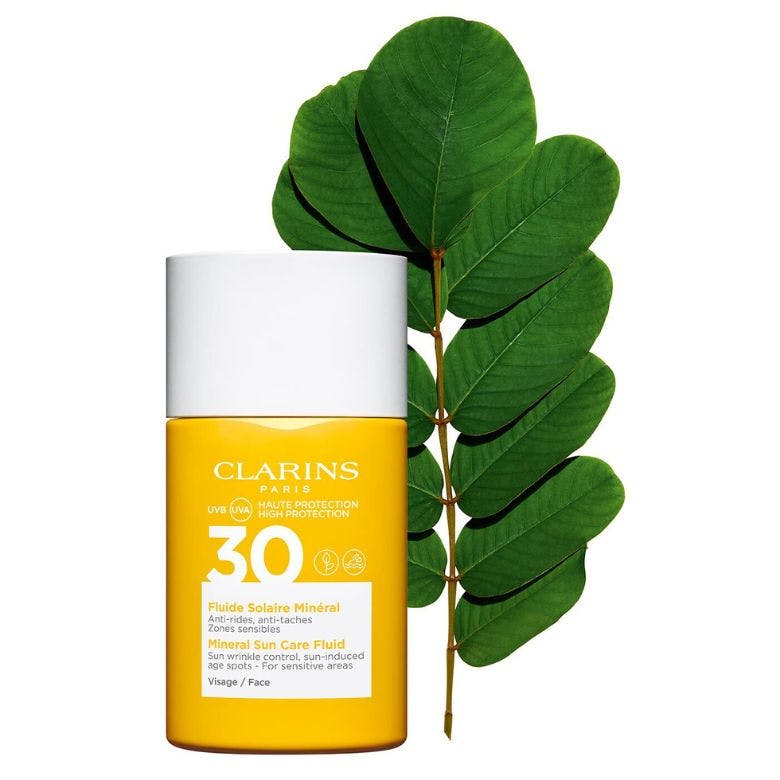Here Are The Benefits of Mineral Sunscreen, According to Experts
7 minutes read
When it comes to protecting your skin from the sun’s harmful rays, there’s one essential item that should always find its way into your shopping basket: mineral sunscreen. With its natural ingredients and superior sun-blocking abilities, mineral sunscreen is a must-have for anyone who wants to keep their skin healthy and radiant while enjoying the great outdoors. Beauty Daily spoke to Ridah Syed, Senior Medical Aesthetician at Skinfluencer London, to find out about the best mineral sunscreens and exactly why they are so beneficial for our skin.

What is mineral sunscreen?
Mineral sunscreens are a type of sunscreen that harness the power of natural minerals like zinc oxide and titanium dioxide. Unlike chemical sunscreens that penetrate the skin, mineral sunscreens work by sitting on the surface and creating a physical barrier that reflects or scatters the sun’s rays.
Are mineral sunscreens safe for babies?
One of the great things about mineral sunscreen is that it’s safe for the whole family, including the littlest members. Mineral sunscreens are gentle and non-irritating, making them ideal for babies and children with delicate skin. In fact, it’s generally recommended to opt for mineral sunscreens over chemical ones on babies. However, it’s always best to consult with a paediatrician before using any sunscreen on your little one.
What does non-nano mean?
You might have come across the term “non-nano” while shopping for mineral sunscreen, but what does it actually mean? Non-nano refers to the particle size of the minerals in the sunscreen. Non-nano mineral sunscreens contain larger particles that sit on top of the skin, reducing the risk of absorption into the body. This means you can enjoy the benefits of mineral sunscreen without worrying about any potential side effects.
“When you apply sunscreen with nano zinc oxide, the super-small particles can penetrate your skin cells and end up in your bloodstream,” says Syed. “Research is ongoing about the dangers that nanoparticles have on human health and so until this research is concluded, most mineral sunscreens prefer to use non-nano zinc oxide.”
How does mineral sunscreen work?
Mineral sunscreens work their magic by forming a protective shield on your skin. As you apply the sunscreen, the tiny mineral particles create a barrier that either reflects or absorbs the sun’s rays, preventing them from reaching the deeper layers of your skin. This action makes mineral sunscreen particularly suitable for individuals with sensitive skin, as it minimises the risk of irritation and allergic reactions.
Benefits of mineral sunscreen
Mineral sunscreens offer a multitude of benefits that make them stand out from their chemical counterparts. “The biggest advantage of a mineral sunscreen is that the protection is instant,” Syed explains. “It’s important to remember that chemical sunscreens must be applied 30 minutes before going outdoors to let the ingredients fully bind to the skin, whereas physical (mineral) sunscreens take effect immediately and can be applied right before sun exposure.”
Here are some of the other key benefits of incorporating mineral sunscreen into your daily face and body skincare routine:
Superior sun protection
Mineral sunscreens provide broad spectrum protection against both UVA and UVB rays. They effectively scatter, reflect, and absorb the sun’s rays, shielding your skin from damage and reducing the risk of sunburn, premature ageing, and even skin cancer.
Gentle on sensitive skin
If you have sensitive or easily irritated skin, mineral sunscreen for the face and body is your best friend. Its natural formula and physical barrier mechanism make it less likely to cause skin irritation or allergic reactions, making it suitable for even the most delicate skin types.
Water resistant
Whether you’re hitting the beach or working up a sweat during outdoor activities, mineral sunscreen has got you covered. Most mineral sunscreens are water-resistant, meaning they won’t wash off easily, providing you with longer-lasting sun protection.
Skin-friendly ingredients
When you choose mineral sunscreen, you’re opting for a product that is formulated with natural minerals like zinc oxide and titanium dioxide. These ingredients are less likely to cause adverse effects on your skin or disrupt your hormonal balance, giving you peace of mind while protecting your skin at the same time.
Best mineral sunscreen UK
Looking for the best mineral sunscreen for face? Try: Clarins Mineral Facial Sun Care Fluid UVA/UVB 30, £24, an SPF mineral sunscreen which contains antioxidants to protect the skin from the sun and free radicals.

How to apply mineral sunscreen
Step 1: Prep your skin
Cleanse your face and body, and ensure your skin is dry before applying mineralised sunscreen. This will allow for better adherence and effectiveness.
Step 2: Dispense and dot
Squeeze a sufficient amount of mineral face sunscreen onto your fingertips and dot it evenly across your face and exposed skin areas. Remember, a little goes a long way.
Step 3: Blend and massage
Gently blend the sunscreen into your skin using upward motions. Massage it in until it’s fully absorbed, creating an even layer of protection. Don’t forget to cover often overlooked areas such as the ears, the back of the neck, and the tops of the feet.
Step 4: Reapply regularly
To maintain optimal protection, reapply your mineral sunscreen every two hours or immediately after swimming or excessive sweating. Consistency is key when it comes to safeguarding your skin from the sun’s harmful rays.
Mineral vs chemical sunscreen
It’s important to understand the difference between mineral and chemical sunscreens to make an informed choice for your skin’s needs. While mineral sunscreens use natural minerals to form a physical barrier, chemical sunscreens often contain organic compounds that absorb and convert UV rays into heat, which is then released from the skin. “Generally, sunscreens are classified as either chemical or mineral,” Syed elaborates.
“Mineral sunscreens feature ingredients such as titanium dioxide or zinc oxide, which are reflectors that act as physical blockers. The minerals form a protective barrier on the skin and reflect UV rays before they can make contact with the surface of the skin.
“Through a chemical reaction, chemical sunscreens filter/absorb UV rays, converting the UV rays into heat that is released from the skin.”
What is a chemical sunscreen?
Chemical sunscreens work by penetrating the skin and absorbing UV radiation, converting it into less harmful heat. “The best chemical sunscreens include avobenzone in their formulations as it is the gold standard of UVA protection, and is the only globally available chemical sunscreen agent that provides proper UVA protection,” Syed explains. “A good chemical SPF will also contain octinoxate, which is the most commonly used ingredient in chemical sunscreen to absorb UVB radiation.”
Those with inflammatory skin conditions such as rosacea need to be careful with chemical sunscreens, as depending on their ingredients, the products could make these sorts of conditions worse.
It’s also important to remember that chemical sunscreens must be applied 30 minutes before going outdoors to let the ingredients fully bind to the skin, whereas physical (mineral) sunscreens take effect immediately and can be applied right before sun exposure.
Does mineral sunscreen work?
“Yes, but you need to reapply approximately every two hours or so, starting with two hours after you have completed the skincare routine,” Syed recommends. “It’s crucial to remember that using a higher SPF does not mean that you can spend longer in the sun – you still should apply it every two hours. Face mists tend to be designed for this purpose – you simply spritz them on your face and allow them to be absorbed into the skin.”
What to look for in a mineral sunscreen
When choosing a mineral sunscreen, keep the following factors in mind to ensure you’re selecting the right product for your needs:
Ingredient check
Look for mineral sunscreens that contain zinc oxide and titanium dioxide as the active ingredients. These minerals offer superior sun protection and are generally well-tolerated by most skin types.
Non-comedogenic formula
To prevent clogged pores and breakouts, opt for a mineral sunscreen labeled as non-comedogenic. This means it won’t block your pores, allowing your skin to breathe freely.
Is mineral sunscreen good for everyday use?
Mineral sunscreen is not only suitable for days spent at the beach or during outdoor activities, but is also perfect for everyday use. Its gentle formula, combined with broad-spectrum protection, makes it an ideal companion for keeping your skin safe from the sun’s rays, no matter where your day takes you.
Read next: The men’s guide to SPF
Daily sunscreen: what SPF is best for your face?
Eye cream with SPF: Stop missing your eye area!
Reef-friendly sunscreen: why it’s better for you and the planet
Sign up for our newsletter
We will keep you in the loop for special offers, exclusive gifts and product news.

